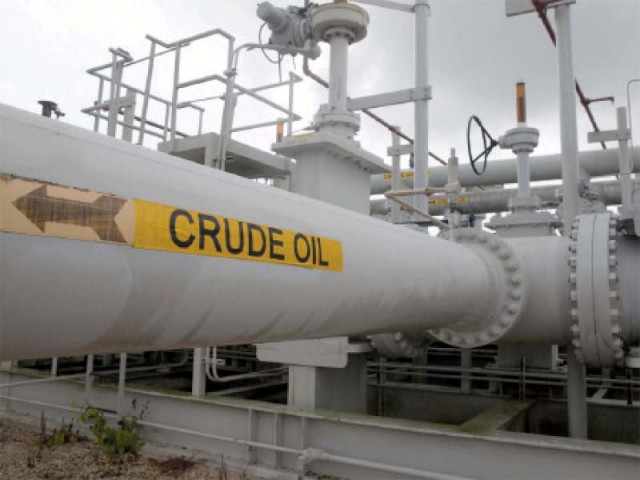UAE mulls building oil reserves
CCOE seeks feasibility study as reserves critical for dealing with oil shortages

The United Arab Emirates (UAE) has shown interest in building strategic oil reserves in Pakistan – a project which will help cope with shortages if such a problem arises in future.
In the past, Pakistan has faced oil shortages several times due to the lack of strategic reserves.
Surprisingly, the government banned imports of petroleum products in 2020, at a time when global crude oil prices crashed following the Covid-19 lockdowns across the world.
However, other countries like China capitalised on the opportunity and imported crude oil in bulk to store the fuel.
Pakistan, on the other hand, failed to cash in on the opportunity provided by the cheap crude oil due to the lack of storage capacity.
Even the government planned to hedge against oil prices but could not execute the plan.
Recently, the crude oil prices were hovering at multi-year highs due to the Russia-Ukraine war before receding back to near $100 per barrel. Different countries such as the United States have started using their strategic reserves due to the geopolitical turmoil.
The reserves of petroleum products, especially high-speed diesel (HSD), are depleting fast, raising the spectre of another fuel crisis across the world if the war continues.
In the past, different governments took up the matter of building strategic oil reserves in the country but could not implement the plan.
The practice of curbing local petroleum production owing to the lack of storage capacity continues as the power sector has refused to lift furnace oil from refineries.
Under such circumstances, experts believe the government should build strategic reserves, even in partnership with friendly countries like the UAE.
Previously, Azerbaijan also offered Pakistan to help build strategic reserves and provide oil on deferred payment without government guarantees. However, after so many years, the plan has not yet materialised.
The UAE already has strategic reserves and has provided the facility to different countries like India for oil storage. Now, it is planning to build oil storages in Pakistan.
The two countries have partnered with each other in Pakistan’s largest oil refinery – Pak-Arab Refinery Limited (Parco). There is also a plan to set up another refinery in the coastal area of Balochistan.
Sources said that the UAE had also offered to export oil to Pakistan for building fuel reserves.
In that regard, the Cabinet Committee on Energy directed the Oil and Gas Regulatory Authority (Ogra) to conduct a feasibility study.
After conducting the study, the government will decide whether state-run energy companies should build the strategic oil reserves or hand over the project to the UAE or any other friendly country.
The committee directed Ogra to undertake a pragmatic study to develop strategic reserves of petroleum products to help Pakistan take benefit of the slump in global oil prices.
The decision was taken during a meeting held under the chairmanship of Federal Minister for Planning, Development and Special Initiatives Asad Umar.
The Petroleum Division presented a report on the development of strategic petroleum reserves. The meeting was informed that a working group comprising Oil and Gas Development Company Limited (OGDCL), Pakistan State Oil (PSO), Pakistan Electric Power Company (Pepco), Parco, Total Parco Pakistan Limited and Pakistan Refinery Limited (PRL) was formed to develop a concept paper and study the strategic reserve requirement in the country.
The group has completed its initial assessment and a detailed feasibility study is being planned based on recommendations of the working group. According to sources, there could be different options for building the strategic reserves. OMCs can build oil reserves in association with the government in a shared model.
In the prospective study, Ogra will also focus on tariff, capacity and locations of the proposed strategic reserves of petroleum products.
It was informed that the maritime ministry had also developed a proposal in that regard.
Therefore, directives were issued to constitute a committee under Ogra with the maritime ministry and Petroleum Division as members for finalising the proposal and reviewing a detailed framework for the establishment of strategic petroleum reserves.
Earlier, PSO was proposed to build the strategic reserves. However, it was estimated that PSO would need Rs15 to Rs20 billion to build the reserves.
The working group had proposed to the government to set up a separate company with the mandate to build the reserves and to allocate Rs1-2 per litre out of the petroleum levy to raise funds for building them.
It further suggested that a separate company should manage funds to build the strategic reserves and added that Pakistan could store more petroleum products when global oil prices declined.
Similarly, the country could use petroleum products out of the reserves when oil prices go up globally.
Mulling over whether the government should build storages for crude oil or petroleum products, the officials mentioned that the countries with storage for crude oil had higher refining capacity, adding that Pakistan only had 40% refining capacity and the rest was imported.
“Therefore, a more feasible option was to build storages for finished petroleum products.” Moreover, Pakistan imports petroleum products from the south to meet demand in the north. Therefore, the working group recommended building storages in the north.
Published in The Express Tribune, March 17th, 2022.
Like Business on Facebook, follow @TribuneBiz on Twitter to stay informed and join in the conversation.



















COMMENTS
Comments are moderated and generally will be posted if they are on-topic and not abusive.
For more information, please see our Comments FAQ